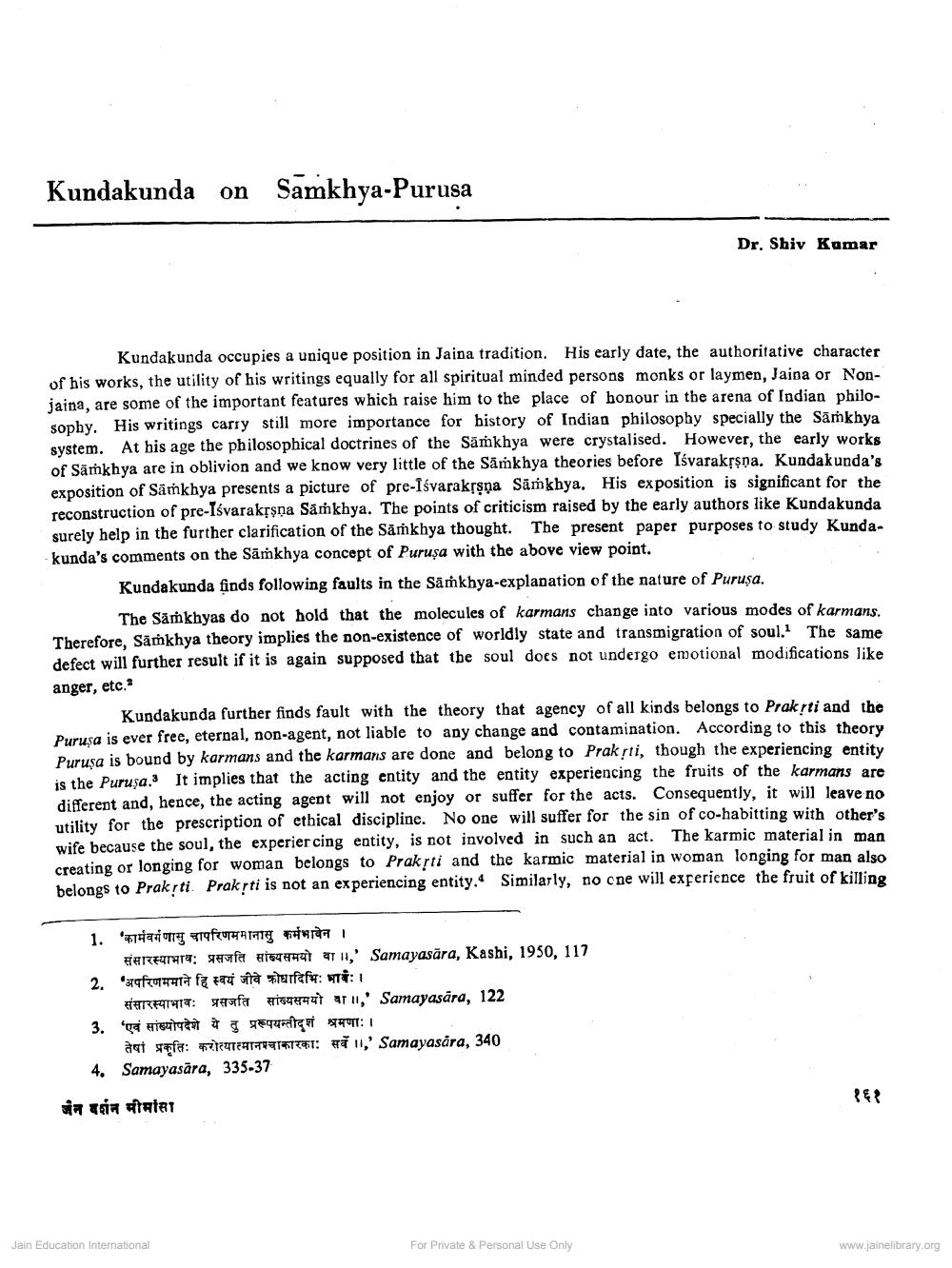Book Title: Kundakunda on Samkhyapurusa Author(s): Shivkumar Publisher: Z_Deshbhushanji_Maharaj_Abhinandan_Granth_012045.pdf View full book textPage 1
________________ Kundakunda on Samkhya-Purusa Dr. Shiv Kumar Kundakunda occupies a unique position in Jaina tradition. His early date, the authoritative character of his works, the utility of his writings equally for all spiritual minded persons monks or laymen, Jaina or Nonjaina, are some of the important features which raise him to the place of honour in the arena of Indian philosophy. His writings carry still more importance for history of Indian philosophy specially the Samkhya system. At his age the philosophical doctrines of the Sāṁkhya were crystalised. However, the early works of Samkhya are in oblivion and we know very little of the Sāmkhya theories before Iśvarakļşpa. Kundakunda's exposition of Samkhya presents a picture of pre-Isvarakrsna Samkhya, His exposition is significant for the reconstruction of pre-Isvarakļyna Samkhya. The points of criticism raised by the early authors like Kundakunda surely help in the further clarification of the Samkhya thought. The present paper purposes to study Kundakunda's comments on the Samkhya concept of Puruşa with the above view point. Kundakunda finds following faults in the Samkhya-explanation of the nature of Puruşa. The Samkhyas do not hold that the molecules of karmans change into various modes of karmans. Therefore, Sâmkhya theory implies the non-existence of worldly state and transmigration of soul. The same defect will further result if it is again supposed that the soul does not undergo emotional modifications like anger, etc.? Kundakunda further finds fault with the theory that agency of all kinds belongs to Prakrti and the Purusa is ever free, eternal, non-agent, not liable to any change and contamination. According to this theory Purusa is bound by karmans and the karmans are done and belong to Praksti, though the experiencing entity is the Purusa. It implies that the acting entity and the entity experiencing the fruits of the karmans are different and, hence, the acting agent will not enjoy or suffer for the acts. Consequently, it will leave no utility for the prescription of ethical discipline. No one will suffer for the sin of co-habitting with other's wife because the soul, the experiercing entity, is not involved in such an act. The karmic material in man creating or longing for woman belongs to Prakrti and the karmic material in woman longing for man also belongs to Prakrti Praksti is not an experiencing entity. Similarly, no one will experience the fruit of killing 1.414 419 HATTE F AI HERE : wwwfer niet a,' Samayasära, Kashi, 1950, 117 'अपरिणममाने हि स्वयं जीवे क्रोधादिभिः भावः। BREYTT: warfa 44441 arl,' Samayasara, 122 ‘एवं सांख्योपदेशे ये तु प्ररूपयन्तीदृशं श्रमणाः । agt wefa: TITATTU741741: = 11,'Samayasära, 340 4. Samayasāra, 335-37 जनवर्शन मीमांसा Jain Education International For Private & Personal Use Only www.jainelibrary.orgPage Navigation
1 2 3 4
